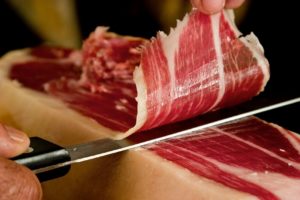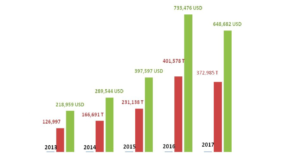
There are literally hundreds of thousands of locally produced products in Europe that are unique to a country, region, town or even a village. These products rely on their authenticity as a sign of quality, when we know without a doubt that a product was produced from an authentic source we know the quality is guaranteed. How can these unique products, sometimes community or family produced, verify their authenticity?
Blockchain technology has already been deployed by food companies in their supply chains, in August 2017, ten of the world’s biggest CPG and food companies partnered with IBM to integrate blockchain into their supply chains. This cohort — Walmart, Nestle, Unilever, McCormick, Tyson, Kroger, McLane, Driscoll’s, Dole, and Golden State Foods — represents more than half a trillion dollars in aggregate annual global sales[i]. However, smaller producers should also be able to benefit from blockchain’s ability to store and share information across a network of users in an open virtual space. For the purposes of this research we are going to concentrate on Spain’s jamón ibérico, or Iberian ham.
Iberian ham comes in many forms, but to be defined as jamón ibérico de bellota (acorn-fed Iberian ham) it must first come from Iberian blackfoot pigs, or from 50% crossbreeds. These pigs must then spend several months of the year roaming the dehesa, a pasture planted with oaks, feeding on grass and acorns. During the last few months before being slaughtered they must live exclusively on this diet. Only 6% of total production comes from 100% pure black Iberian pigs raised on dehesas and these are concentrated in two very specific parts of Spain: Andalucía and Extremadura. Nine out of every 10 black labels come from these two regions.
As if all the labeling were not confusing enough, there are now question marks regarding the purity of the animals themselves. There are 435,000 registered specimens with the Spanish Association of Iberian Pig Breeders (Aeceriber). Around 341,000 of these were incorporated following a 2014 government decree giving breeders two years to register all genetically pure animals. But instead of demanding expensive DNA tests (costing at least €20 a head), the decree authorized the registration with nothing more than a visual inspection by an expert veterinarian.
This is big business. According to the statistics published by the Chinese Customs Administration, in 2017 the sales of pork products from Spain to China suffered a reduction, dropping by 7.1% in terms of volume and by 11.5% in terms of value with respect to 2016, the total figures being 372,985 tonnes with a value of $648.6 million (€574.2 million). The main reason was the rise in production in China and a drop in prices after an exceptional 2016 in which all Chinese pork imports (from all origins) reached the record figure of 3,132 million kilos. Nevertheless, the Spanish exports were less affected than those from all origins as a whole, because the total pork imports in China fell by 17% in terms of volume and by 23% in terms of value with respect to the previous year. Therefore, Spain had a better market share in 2017 and reached the first place as meat supplier, beating Germany, Canada and the USA. The Chinese are learning breeding production methods fast.

Figure 1Evolution of the sales of pork products from Spain to China in terms of volume and value.
At present The European Commission guarantees the tradition, health and quality of each ham, covered by Protected Designation of Origin certificates that deem the product has been produced according to traditional methods and within a defined geographic region and special localisation. The PDO seal also serves to distinguish these fine foods from lower quality imitations and guarantees authenticity. Why not put the PDO on the Ethereum blockchain? Why not approach the breeders and breeder’s associations in Andalucía and Extremadura with an Ethereum blockchain solution regarding their authenticity?
There are thousands of examples of artisan products in Spain alone which could benefit from verifying their authenticity; olive oil, Rioja wine, the endless varieties of cheese, fruit, nuts and other food and beverages. And that’s just the gastronomic delights that Spain has to offer, other products include ceramics, linen, leather, marble, musical instruments and more.
Verifying the authenticity of locally produced products will be as vital as the protection of our own personal online data in the years to come, without it imposters could drain millions of Euros from rightful owners and have the potential to destroy entire communities.